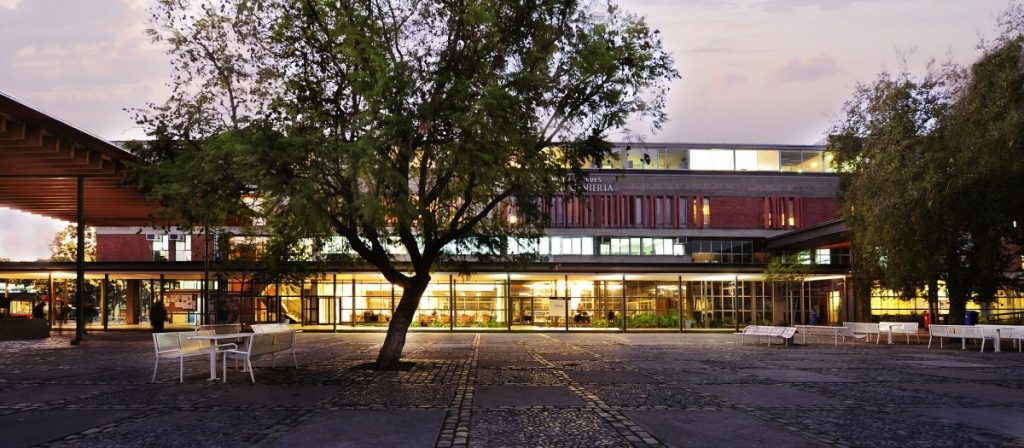Dirección de Educación
en Ingeniería
Escuela de Ingeniería UC
Trabajamos para apoyar, mejorar y fortalecer la docencia dentro de la Escuela de Ingeniería UC, mediante la realización de asesorías docentes, gestión de ayudantes, creación y utilización de instrumentos de medición para informar y gestionar la docencia (Encuesta de Carga Académica, análisis de encuestas docentes, creación de diversas encuestas relacionadas). Además de promover innovaciones en la docencia, tales como los ayudantes de bienestar, quienes se encargan de apoyar a estudiantes que enfrentan dificultades para desempeñarse académicamente.

.
.
.
.
Acceso rápido
Si eres profesor, ayudante o estudiante de la Escuela de Ingeniería UC, aquí tenemos recursos que te pueden ser de utilidad.
¡Conoce nuestras principales actividades!
Todas trabajan en conjunto para otorgarles a estudiantes, ayudantes y docentes una mejor experiencia.
Nuestro Equipo
Jorge Baier
Director de Educación en Ingeniería
Isabel Hilliger
Subdirectora de Medición, Evaluación y Calidad
Gabriel Astudillo
Coordinador de Medición, Evaluación y Calidad
Carolina López
Coordinadora de Mejora Continua
Luis Vargas
Coordinador de Desarrollo Docente
Marjorie Oliveros
Coordinadora de Ayudantes
Erick Svec
Jefe de Proyecto de Herramientas Informáticas
Publicaciones
LIFELONG LEARNING: ESTRATEGIAS DE EVALUACIÓN DIRECTAS E INDIRECTAS EN ESTUDIANTES DE INGENIERÍA
Isabel Hilliger, Ximena Hidalgo, Jorge Baier
Work-In-Progress: Caring for Student's Academic and Personal Challenges via The Wellbeing Teaching Assistant
Jorge Baier, Isabel Hilliger, Matías Piña, Ximena Hidalgo, Gabriel Astudillo, Loreto Valenzuela
CAMBIOS EN LOS TÓPICOS SOBRE PERCEPCIONES DE LA DOCENCIA POR PARTE DEL ESTUDIANTADO: ANÁLISIS DE COMENTARIOS DE LAS ENCUESTAS DOCENTES
Gabriel Astudillo, Isabel Hilliger, Jorge Baier
Work in progress: Engaging engineering teaching staff in continuous improvement process
Isabel Hilliger, Sergio Celis, Mar Pérez-Sanagustín, Jorge Baier
For learners, with learners: Identifying indicators for an academic advising dashboard for students
Work in progress: What makes courses demanding in engineering education? A Combination of mixed methods and grounded theory research
Isabel Hilliger, Constanza Melian, Javiera Meza, Gonzalo Cortés, Jorge A Baier
What is care in Engineering teaching?
Jorge A Baier, Isabel Hilliger, Ximena Hidalgo, Constanza Melian
Offering an entrepreneurship course to all engineering students: Self-efficacy gains and learning benefits
Isabel Hilliger, Constance Fleet, Constanza Melian, Jorge Baier, Mar Pérez-Sanagustín
FAIS: A System for Effectively Learning Students Names and Faces in Massive Courses
Jorge Munoz-Gama, Raul Alvarez-Esteban, José Montalva-Carmona, Jorge Baier
Offering an Entrepreneurship Course to All Engineering Students: Lessons Learned from ING2030 in Puc-Chile.
Isabel Hilliger, Constance Fleet, Constanza Melian, Jorge Baier, Mar Pérez-Sanagustín
Engaged Versus Disengaged Teaching Staff: A Case Study of Continuous Curriculum Improvement in Higher Education
Isabel Hilliger, Sergio Celis, Mar Pérez-Sanagustín
A MOOC-based flipped experience: Scaffolding SRL strategies improves learners’ time management and engagement
Mar Pérez-Sanagustín, Diego Sapunar-Opazo, Ronald Pérez-Álvarez, Isabel Hilliger, Anis Bey, Jorge Maldonado-Mahauad, Jorge Baier

